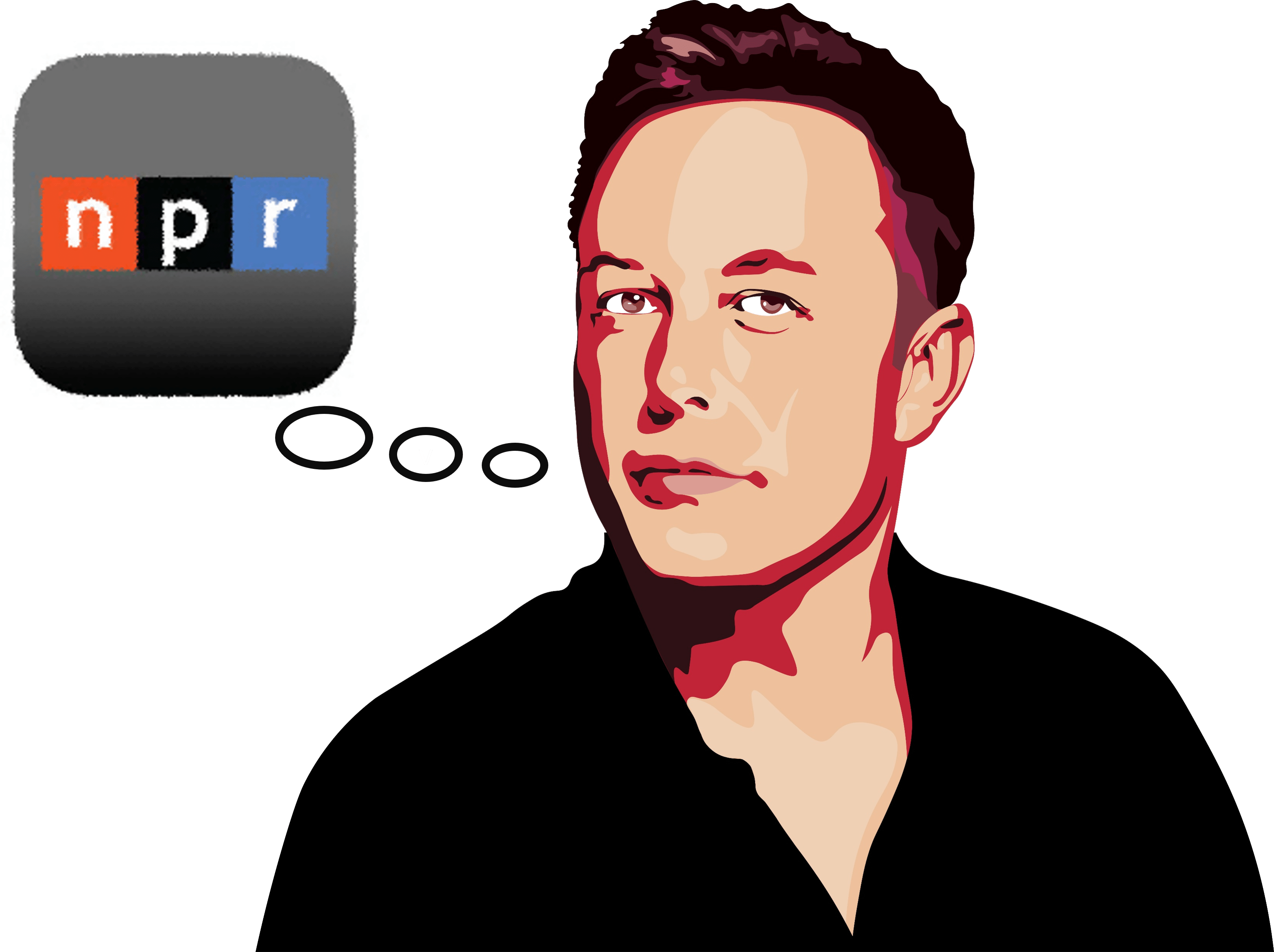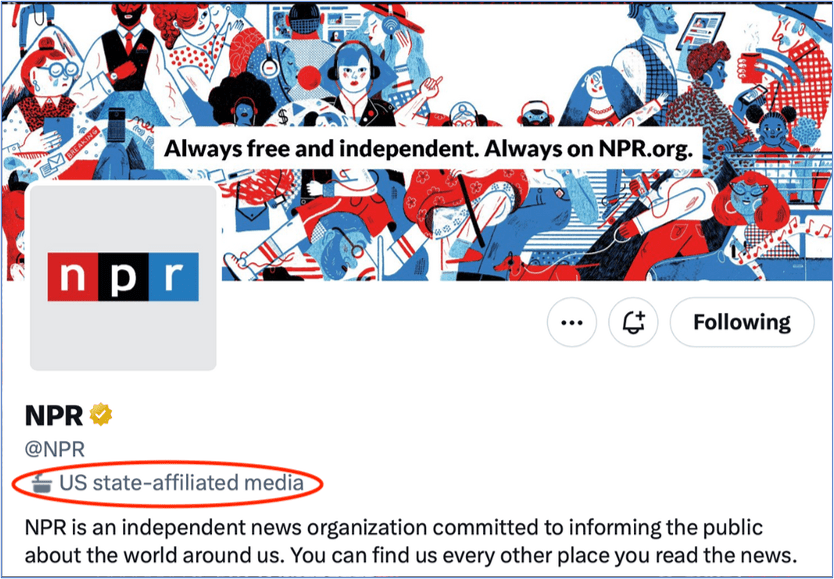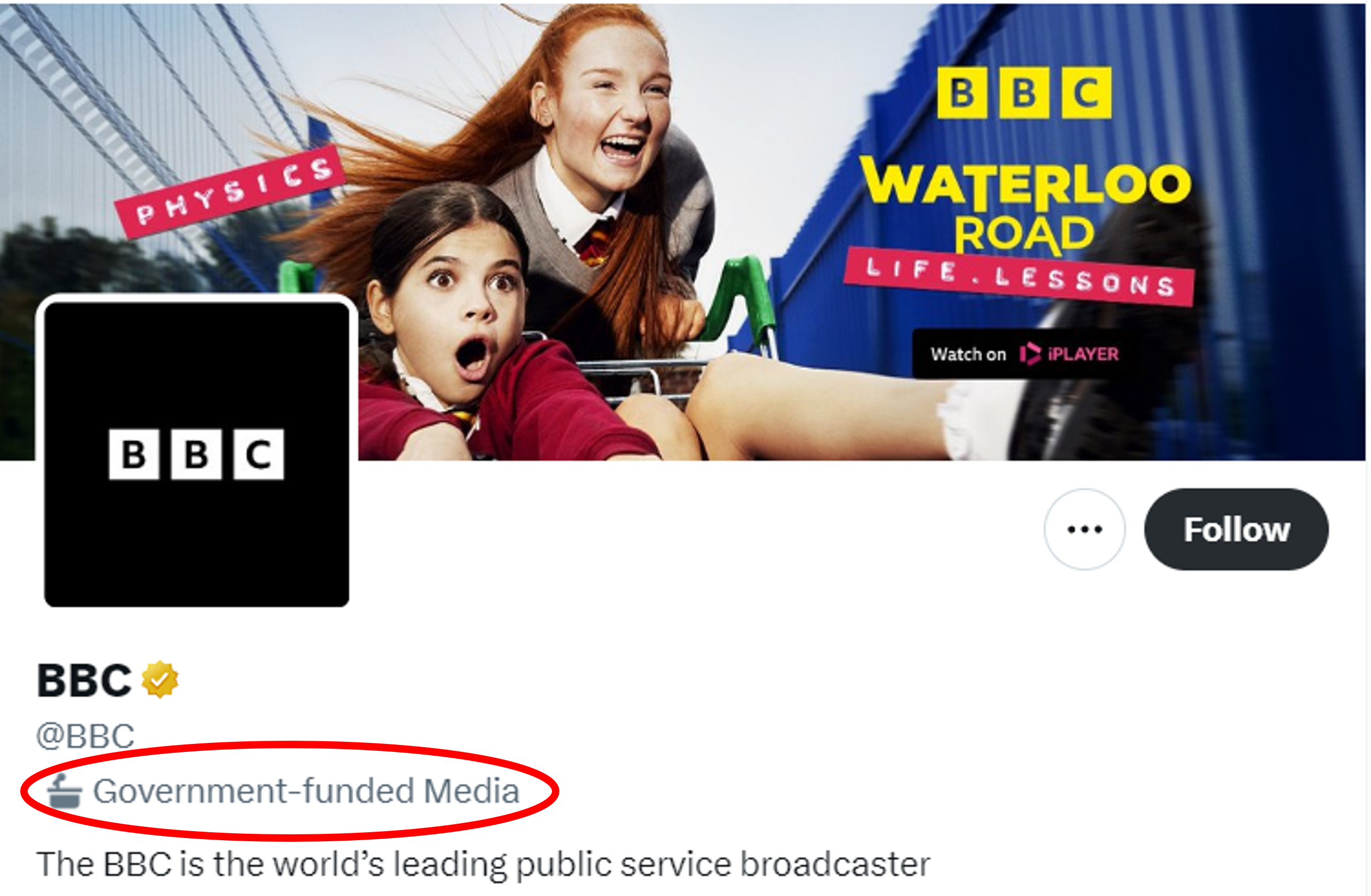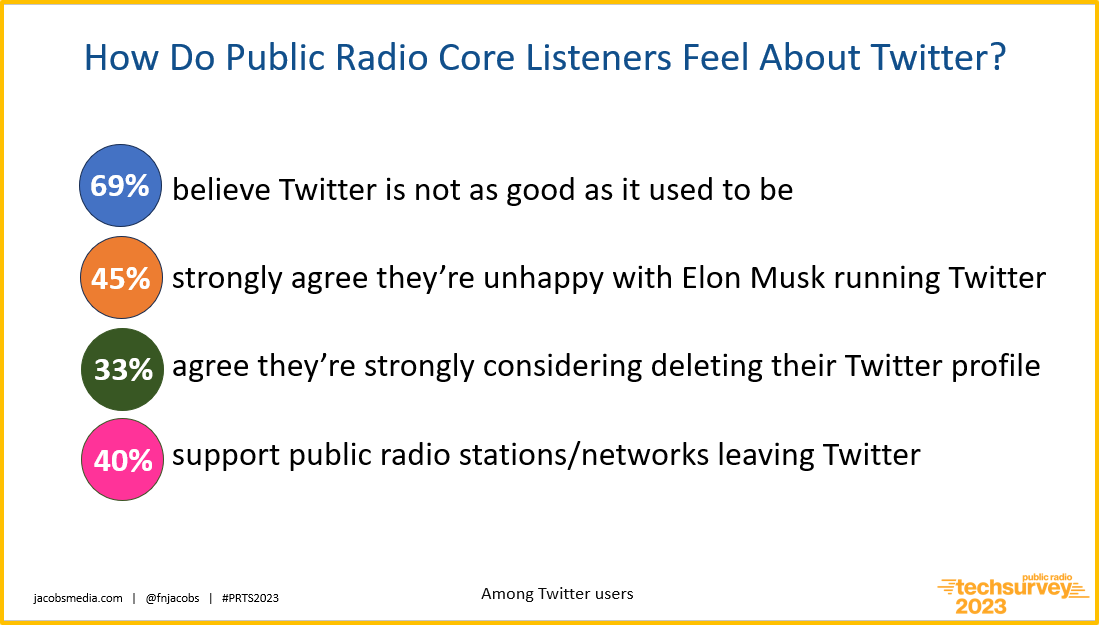
This one’s going to be different. That’s because this “Best of” post from way back in April of this year has already had some follow-up. As the title implies, it’s all about the kerfuffle between Twitter and NPR. And it’s two CEOs – Elon Musk and John Lansing.
So to reverse engineer the controversy, here’s the original post from eight months ago. And at the end, I’ll have an update from this past week to bring it all up to the present. Can you stand the suspense? – FJ
April 2023
The Elon Musk / Twitter saga gets weirder by the week. If you’re not exactly sure what Musk is actually trying to accomplish with Twitter, join the group.
We do know this – Musk paid in the neighborhood of $44 billion for Twitter late last year. Unlike social platforms like Facebook and Instagram, Twitter has struggled to find its purpose. On the one hand, Twitter is meme-heavy, humorous, and snarky. On another, it can be a fascinating news source, often getting to a story quicker than major league news operations like the Associated Press, Wall Street Journal, the BBC, and the New York Times.
Unlike other social platforms whose mission is to connect people with people, there’s a B2B quality to Twitter. Its participants are often icons in pop culture, sports, journalism, media, literature, and politics. Twitter communities are collections of users who want to know the inside scoop about what is near, dear, and fascinating to them. While it may never be the biggest, Twitter has almost always been the most edgy, controversial, and topical of its ilk.
And that’s what Musk bought. Clearly though, he’s had an agenda from the beginning, hurling around epithets like “free speech” while often taking the media to task. His unpredictable “hot takes” have consistently made headlines, in much the same way Donald Trump used the platform as a tool – or cudgel – to communicate his observations….about pretty much everything during those early years when he sidestepped the media by craftily using Twitter as his social media megaphone.
Since purchasing the platform, Musk seems to be walking a jagged line that may have just landed Twitter in a variant of the old “you break it, you buy it” category. In Musk’s case, the reverse may be true.
How bad a start has it been for the Musk Era of Twitter? The New York Times recently got a look at an email to Twitter employees last month that quotes Musk saying the social platform is now only worth $20 billion – less than half what he paid a mere six months ago.
Impressive.
When the Times announced it would not pay for its telltale Twitter “blue check,” the subscription model Musk put into effect, he went after them with both barrels.
The real tragedy of @NYTimes is that their propaganda isn’t even interesting
— Elon Musk (@elonmusk) April 2, 2023
In a war of words…and facts….my money’s on The Times.
Last week, it was NPR’s turn in the Musk barrel.
In a move that shocked news outlets everywhere, he designated NPR as “US state-affiliated media,” a label usually reserved for news outlets whose content is controlled by the government – like in China or Russia.

Whether you’re a tote bag carrying fan of NPR and public radio or someone who doesn’t appreciate its reporting, there’s no argument any government has anything to do with what’s on their airwaves.
That elicited a quick but measured response from NPR’s CEO, John Lansing. He pushed back against the Twitter designation, noting the organization was “disturbed” by the label. Lansing added the move was “unacceptable,” nothing “a vigorous, vibrant free press is essential to the health of our democracy.”
Nice words with a dash of NPR’s patented understated civility. But when you find yourself in a nuclear war with a free-wheeling, say-anything bully like Musk, you’re in an altogether different kind of fight. Welcome to the jungle.
One thing you’ll note if you follow NPR – they stopped tweeting on their account not long after Musk relabeled them. And if you look at their Twitter slug line, it now reads “You can find us every other place you read the news.” The emphasis is mine, but the message clear. NPR will no longer contribute content to Twitter.

NPR’s business reporter, Bobby Allyn, put on his dogged journalist hat and chased down Musk with a barrage of emails questioning the Twitter label. Eventually, the bodacious billionaire responded in what turned into a back and forth that is nothing short of fascinating. You can read a transcript of Allyn’s story, as told to NPR reporter/anchor, Mary Louise Kelly or listen to the audio below.
In the interview, Allyn explains Musk’s thinking about the way he labeled NPR “has just been all over the place.” In reality, Twitter’s CEO doesn’t really understand the distinction between public media and a government controlled entity like Tass.
Not surprisingly, the last thing Musk is doing is reasoning with the facts. He actually asked Allyn for the particulars of NPR’s funding (in reality, about 1% comes from government grants) and how the organization’s leadership is chosen (an independent board makes those calls). Of course, that info is available for anyone to see on NPR’s website.
Not long after, Twitter (or Musk) changed NPR’s label to “Government funded media,” which remains on its banner as of this morning.
To its credit, NPR is still not tweeting, obviously wondering how an organization that gets 1% of its funding from Uncle Sam merits the new designation.
The BBC is wondering, too. They’re another media outlet that got tagged with this Twitter label, despite the fact their funding comes from the citizens of Great Britain.

Somehow, every 8 year-old in primary school in the UK knows what apparently Elon Musk is unaware of – or doesn’t care to learn about the not-so-mysterious origin of BBC revenues.
In a terse “explainer” story from the BBC a day ago, journalists James Clayton and Adam Durbin wrote that Twitter has been contacted to set the record straight:
“The BBC is, and always has been, independent. We are funded by the British people through the license fee.”
Unlike NPR, the BBC is still tweeting away – “feeding the beast,” as former NPR CEO Jarl Mohn put it to me yesterday.
But KCRW isn’t. The legendary news/music combo station out of Santa Monica is supporting NPR by also no longer throwing any more verbal chum into Twitter’s roiling waters.
KCRW will no longer share our content on Twitter from this account.
📌 Here’s a guide to how you can keep up with us off of Twitter:
— KCRW (@kcrw) April 7, 2023
Kudos to KCRW manager Jennifer Ferro for standing in solidarity with NPR. It begs the question why other public radio stations across the country aren’t doing the same.

Twitter makes its living from content produced by some of the world’s biggest and most influential media outlets. Ferro is saying “no” and other pubic radio stations should have the courage (and good sense) to join KCRW.
For that matter, Jarl Mohn wonders why other credible news media outlets are still doing business on a platform that calls them out as propagandists or mislabels their funding source. It’s misinformation of the worst kind, it erodes journalism in the U.S. and the world, and it sows more anger and divisiveness – as if we don’t have enough.

For NPR, KCRW, and other public radio stations who opt to suspend their tweeting as long as Musk paints them with the inaccurate Twitter brush, this incident may turn out to be a blessing in disguise.
In the past, various members of Congress have threatened to defund public radio (and NPR), including Newt Gingrich’s assault nearly 30 years ago. No, I don’t have the spreadsheets to validate it, but it seems like every time public media funding is placed in jeopardy by an errant politician, the dollars of support to NPR come flowing in from all quarters – listeners, foundations, businesses, and organizations.
Thanks to Twitter’s new owner and half-baked policies, that is likely happening right now. And for NPR, not a moment too soon. If you’ve been following the travails the public media network has endured these past few years, you know its own news cycle has been nothing short of precarious.
NPR has lost high-profile talent, including Audie Cornish (to CNN), Lulu Garcia-Navarro (to the New York Times), Sam Sanders (to podcasting world), and others.
Overall, NPR’s podcasting dominance has slipped, perhaps forcing the public media network to cut a sales and distribution deal with Spotify.
And then just a couple weeks back, NPR laid off 10% of its staff, while terminating the production of four of its podcasts.
In a left-handed paradoxical way, the Musk assault could turn into a morale – and financial – booster for NPR – if it shows leadership and courage.

Maybe that means inviting Musk on the air for a “conversation” about media, journalism, and democracy. I’m not an assignment editor, but my choice for host would be the aforementioned Mary Louise Kelly. She’s fearless, relentless, smart, and prepared – and she can go 12 rounds with anyone, especially shoot-from-the-hipsters like Elon Musk.
Or perhaps invite Twitter’s new boss for a VIP tour through NPR headquarters in D.C. to learn first-hand what a paragon of journalism looks, sounds, and feels like.
OK, maybe it’s the PD in me that sniffs marketing opportunity when I get a whiff of the arbitrariness and capriciousness of an attack from a blowhard like Musk.
As Jarl reminds us, “Sometimes, you have to take a stand.” This would be a good time for that.
You could sell that Tesla, stop tweeting, or choose another way to stand up for journalism.
If they play it right, for NPR, this could prove to be a better fundraiser than any pledge drive – or indictment.
So, that set the stage for the duel between these two companies. The question is, were either of them hurt for taking a stand – and were either helped?
In November, Nieman Lab ran an analysis after six months of this battle between media brands. And their conclusion?
The effect of not being on Twitter on NPR? “Negligible.”
They concluded that despite predictions to the contrary, NPR’s presence on Twitter/X “may not be worth the effort.”
Yes, I blogged about it back in October.
To assess what the public radio core audience thought of NPR’s departure from tweeting – or Xing – we included pointed questions in this year’s Public Radio Techsurvey, fielded this past summer.
The slide below sums up how core public radio fans see it:

And finally, the exclamation point.
In a combination farewell/please donate email – Lansing will leave NPR in 2024 – he gave his own summary after 260 days of his organization being Twitter-free:
“I have no regrets about this decision.”
And he pointed out how thousands donated to support NPR after its dust-up with Elon Musk.
And so we’ll come full circle. In April, we posed the question whether Musk might “be doing NPR a big favor.”
And as Nieman Lab reported in October, and John Lansing concluded last week, that looks to be exactly what’s happened.
Boldness isn’t always rewarded. But in a highly politiized environment that gets more polarized with each passing month, taking a stand and staying with it can prove to be rewarding.
gets more polarized with each passing month, taking a stand and staying with it can prove to be rewarding.
Especially when you have a strong sense on who your audience is and what they believe in.
- Media And Technology In 2025: Believe It Or Not! - April 18, 2025
- In Radio, You Just Never Know - April 17, 2025
- The Secret To Making A Great Podcast (And Great Radio) - April 16, 2025





Immediate and creditable news sources connecting with IT Announcer brilliance add to the essential immediacy of licensed broadcasting. Here’s to the 2024 Come Back Year!
Ready when you are, Clark. HNY to you and yours.
Like crypto, Xitter has always struck me as a solution looking for a problem. When it didn’t find one, it tried to eat radio’s lunch instead. I have no sympathy for Musk’s indigestion.
Happy new year, Fred!
Twitter was always a nichey platform even if its best days. Whether it’s a politician or meglomaniac like Musk that alienate segments of an already naarrow audience, there’s trouble. Public radio stations have “responsible social citizens,” the kind Twitter needs to cultivate, rather than alienating than repelling them. Sort of like telling advertisers to “Go F yourself.” It’s bad business.
HNY to you and yours, John.
HNY to you, John. You echoed my comment to Ron Harrell who is a Musk fan. Like so many other aspects of our 21st century lives, we take sides on just about everything – sadly.
Elon Musk is a modern day American hero. Revealing government interference on social media platform like Twitter. Those of us who care about the freedom of expression without government interference are fans on Musk.
And he has many fans, to be sure. Unfortunately, like so many well-known players on the world stage today, he has polarized as many as he enthralls. Maybe that’s just the way it is, Ron, but in the case of Twitter (and maybe Tesla), it appears to have hurt these brands. Perhaps he’s rich enough he doesn’t have to care, but his bombasticness is now as talked about as his innovativeness – which IMO – is too bad. Thanks for the comment.
Please give us an example of “government interference.”
And did you even bother reading the post or is Musk all you saw?
Not that we are a big enough entity to matter, but even before NPR or KCRW, WEXT left Twitter. We did so within a couple of weeks of Musk’s take over. Why? We saw the writing on the wall. His allowing of more hate speech and worse, under the guise of “free” speech seemed to shift right away. His tenor and his tone-setting seemed to go against our brand of positive building up and supporting independent artists. We felt his brand would hurt our brand. and he continued to take steps like that. When the NPR dust up occurred, we felt very good about our decision. We left our brand on there, but turned off our interaction, and stopped feeding the beast.
We still feel that not being active on X is the right move. We are not journalists, nor are we a news outlet. We are about lifting up independent artists and music. We know that musicians were torn by this. it was a great way for them to find an audience. It seems they’re finding greater success on Instagram, and TikTok these days.
Good luck sorting through it all!
It’s messy to be sure, Chris. But ultimately, I think decisions like this one for brands that know what they stand for are relatively easy. And as NPR and others discovered, the resulting web traffic from being on Twitter probably isn’t worth the downsides of your station hanging out in a sketchy neighborhood.
Congrats to you for taking an early stand on this one. As you saw in the PRTS data, the audience oeverwhelmingly supports it.